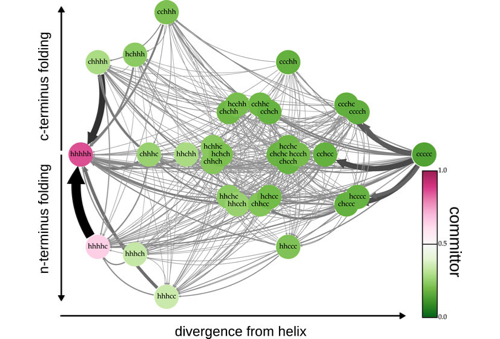Joseph F. Rudzinski and Tristan Bereau, Journal of Chemical Physics (2018)
Structural-kinetic-thermodynamic relationships for peptide models
Coarse-grained molecular simulation models have provided immense, often general, insight into the complex behavior of condensed-phase systems but suffer from a lost connection to the true dynamical properties of the underlying system. In general, the physics that is built into a model shapes the free-energy landscape, restricting the attainable static and kinetic properties. In this work, we perform a detailed investigation into the property interrelationships resulting from these restrictions, for a representative system of the helix-coil transition. Inspired by high-throughput studies, we systematically vary force-field parameters and monitor their structural, kinetic, and thermodynamic properties. The focus of our investigation is a simple coarse-grained model, which accurately represents the underlying structural ensemble, i.e., effectively avoids sterically-forbidden configurations. As a result of this built-in physics, we observe a rather large restriction in the topology of the networks characterizing the simulation kinetics. When screening across force-field parameters, we find that structurally accurate models also best reproduce the kinetics, suggesting structural-kinetic relationships for these models. Additionally, an investigation into thermodynamic properties reveals a link between the cooperativity of the transition and the network topology at a single reference temperature.

